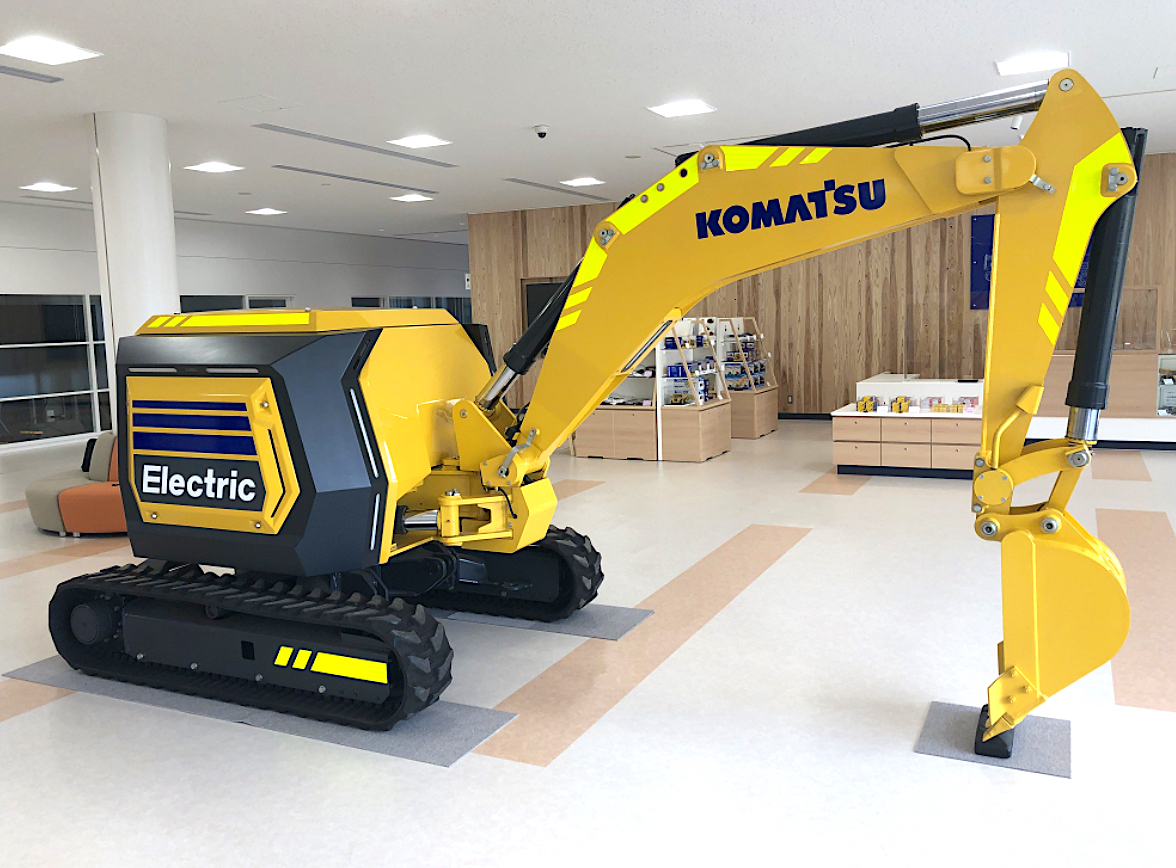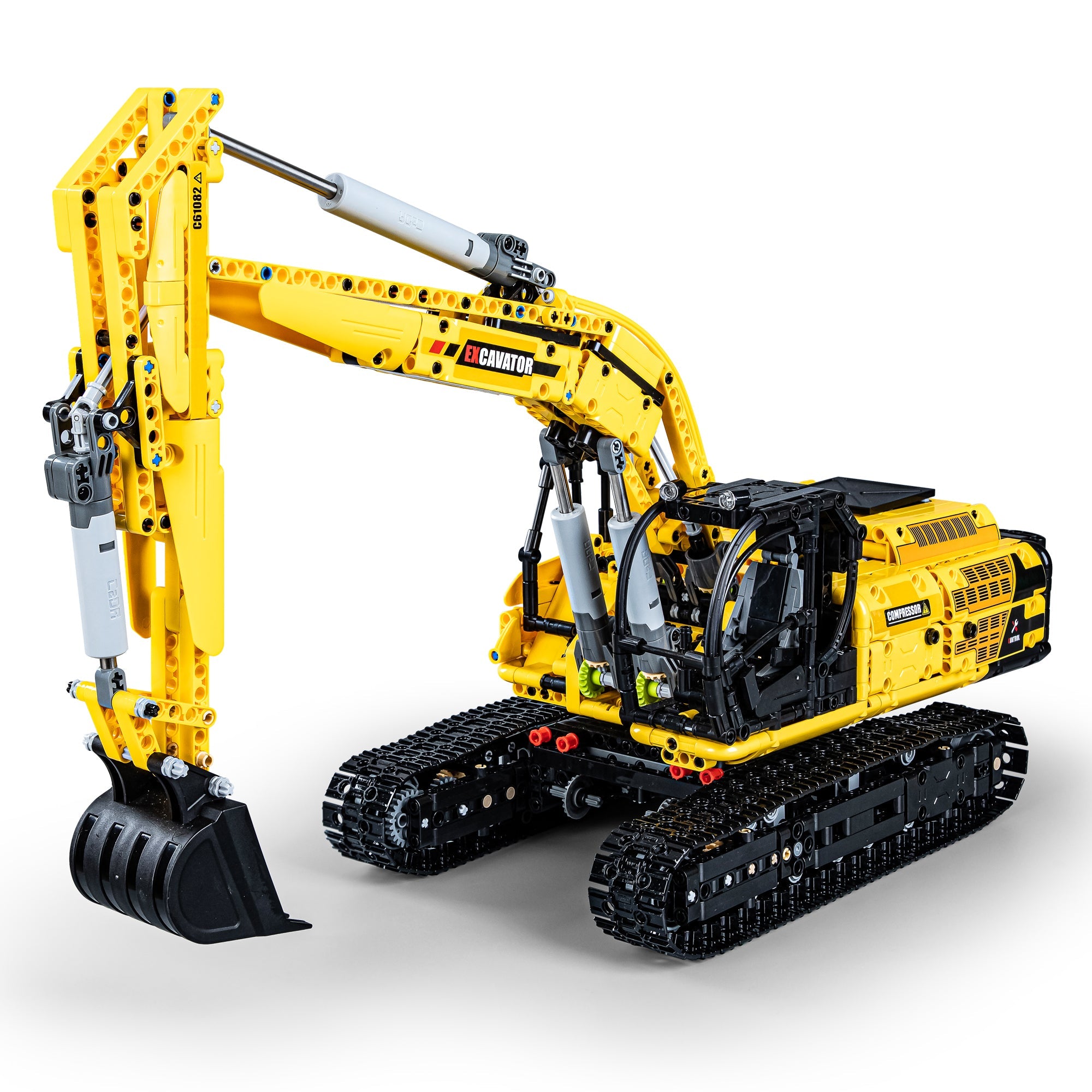How to Get the Most Out of Your Double E Volvo rc excavator for Demolition Work
Recognizing Just How Excavator Functions and Its Impact on Performance
Excavators play an essential role in building and construction and mining procedures, relying upon an intricate interaction of hydraulic and mechanical systems. Their capability to carry out a selection of jobs pivots on both their design and the modern technology integrated within. Understanding these components can greatly affect functional efficiency and productivity. As developments proceed to reshape the market, one have to consider exactly how these modifications will affect future techniques and performance.
The Basics of Excavator Mechanics

The Duty of Hydraulic Systems in Excavators
At the heart of excavator operation lies the hydraulic system, which plays a critical duty in powering the machine's functions and activities. This system uses pressurized hydraulic liquid to move energy, making it possible for various actions such as training, moving, and digging. By using the concepts of hydraulics, excavators can perform jobs with remarkable accuracy and pressure, enhancing overall operational efficiency.The hydraulic system includes crucial elements, consisting of pumps, shutoffs, and cylinders, which collaborate to manage the circulation and direction of the liquid. When the operator engages the controls, the hydraulic liquid is guided to details cyndrical tubes, converting the driver's commands right into physical activity. This system enables smooth and responsive activities, which are vital in building and construction and excavation settings. double e volvo rc excavator. The effectiveness of the hydraulic system directly impacts the performance and adaptability of the excavator, making it an indispensable component in modern excavation procedures
Secret Parts of an Excavator
Comprehending the vital elements of an excavator is necessary for grasping exactly how this effective machine operates. An excavator includes a number of substantial aspects, including the undercarriage, house, arm, boom, and pail. The undercarriage supplies security and wheelchair, commonly featuring tracks or wheels to navigate different surfaces. Your home includes the engine and hydraulic systems, permitting the driver to control motion and power the maker. The boom expands from your house, making it possible for vertical reach, while the arm attaches to the container, assisting in digging and lifting operations.Additionally, the cab houses the operator, equipped with controls for exact maneuvering. Each of these components plays an essential role in the excavator's overall functionality, adding to its performance and performance on building and construction sites. Recognizing these components assists in maintaining and enhancing excavator performance, ensuring jobs are completed safely and successfully.
Accessory Flexibility and Its Benefits
Add-on flexibility is a crucial facet of excavators, enabling drivers to change between numerous devices tailored for specific jobs. This flexibility not just boosts work effectiveness but additionally contributes to cost-effectiveness by minimizing the requirement for numerous devices. Recognizing the various kinds of attachments available can considerably influence the overall performance and capability of an excavator on job sites.
Kinds of Accessories
While excavators are largely recognized for their digging capabilities, their true flexibility hinges on the large selection of accessories readily available. These accessories boost the excavator's functionality, enabling it to carry out various tasks past excavation. Usual accessories include containers (for excavating and scooping), hydraulic thumbs (for comprehending products), and augers (for drilling openings) Grapples are used for moving and taking care of particles, while rippers can damage up hard surface areas. Other specialized add-ons, such as trenchers and plows, allow excavators to adapt to details job demands. This diversity not just enhances the maker's energy across different industries, including construction, landscape design, and demolition, however likewise permits operators to customize their equipment to satisfy particular job needs effectively.
Increased Work Effectiveness
Maximizing work performance is a main benefit of utilizing numerous excavator attachments. Different attachments permit an excavator to perform numerous jobs without needing to switch over equipment, saving valuable time and labor. Using a hydraulic blog hammer can damage concrete while a pail accessory can excavate soil, allowing a smooth process. This convenience decreases downtime related to tools modifications and enhances productivity on-site. In addition, specialized add-ons improve accuracy in jobs such as grading or landscape design, resulting in greater quality end results. The capacity to adapt to numerous work requirements not just simplifies procedures but likewise decreases the need for extra machinery, guaranteeing that projects are completed quickly and effectively. Generally, add-on convenience significantly adds to boosted job efficiency in excavation job.
Cost-Effectiveness and Convenience
Cost-effectiveness is a considerable advantage of utilizing flexible excavator accessories. These accessories enable a solitary excavator to execute multiple tasks, minimizing the requirement for extra equipment and labor - double e volvo rc excavator. By changing between buckets, hammers, and grapples, operators can take on different projects, from excavating to demolition, thus maximizing tools usage. This versatility not only lowers operational expenses however also reduces downtime associated with altering devices. In addition, the capacity to tailor excavators with specialized attachments improves productivity, as they can effectively take care of varied jobs according to project demands. To wrap up, the combination of cost-effectiveness and adaptability in excavator accessories adds to enhanced functional efficiency and resource allotment in building and excavation projects

Advanced Modern Technology in Modern Excavators
Modern excavators are increasingly outfitted with advanced technology that changes excavation processes. Automation enhances operations, while improved gas efficiency decreases operational prices. Furthermore, smart control systems boost accuracy and security, noting useful reference a substantial development in excavation equipment.
Automation in Excavation Processes
As excavation modern technology develops, automation has become an important element in improving effectiveness and precision on job websites. Modern excavators are outfitted with sophisticated automated systems that help with tasks such as grading, digging, and trenching with minimal operator treatment. These systems use sensors, GPS, and maker understanding algorithms to assure precise placing and deepness control, considerably decreasing the margin for mistake. Additionally, automation permits operators to focus on strategic decision-making instead of hands-on controls, resulting in boosted efficiency overall. Such innovations not just improve operations however also enhance safety by reducing human mistake in complicated procedures. The combination of automation in excavation procedures represents a substantial advancement in building and construction modern technology, driving the industry towards higher effectiveness and performance.
Boosted Gas Effectiveness
Improvements in modern technology have additionally resulted in substantial renovations in gas performance for modern excavators. Modern equipments are outfitted with innovative engines that maximize power result while lowering gas usage. These engines use ingenious combustion technologies, such as turbocharging and direct fuel injection, to enhance efficiency and performance. In addition, light-weight materials in construction reduce overall weight, enabling for less power expense during operation. The intro of variable rate controls allows operators to change engine performance according to particular jobs, better lessening fuel use. Because of this, these enhancements not only reduced operational expenses however likewise contribute to environmental sustainability by lowering discharges. In general, enhanced gas effectiveness in excavators is a necessary growth that reinforces efficiency and economic stability in the construction sector.
Smart Control Solution
While drivers navigate progressively complicated work sites, clever control systems in excavators have arised as crucial tools for boosting effectiveness and precision. These sophisticated modern technologies use sensing units and formulas to keep track of numerous specifications such as lots weight, terrain problems, and operational efficiency. By automatically changing hydraulic features, smart systems enhance machine efficiency, resulting in improved performance and decreased endure components. Furthermore, drivers gain from user-friendly interfaces that supply real-time feedback and diagnostics, enabling for educated decision-making. This assimilation of technology not only simplifies operations but likewise minimizes human error, adding to more secure job settings. As the construction market remains to advance, wise control systems will play an essential function fit the future of excavator performance and effectiveness.
Enhancing Operational Effectiveness With Excavators
Excavators play a necessary duty in boosting operational performance across various building and construction and excavation projects. Their versatility enables several tasks, consisting of training, excavating, and product handling, which improves process and decreases the requirement for additional equipment. With effective hydraulic systems, excavators can execute sturdy jobs with precision, significantly reducing the time required to complete tasks. The assimilation of innovative innovation, such as GPS and automated controls, even more optimizes their procedure, allowing drivers to achieve greater accuracy and reduce product waste. In addition, contemporary excavators are made to eat less fuel and decrease discharges, contributing to both cost financial savings and ecological sustainability. By utilizing excavators effectively, construction groups can improve efficiency, fulfill job deadlines, and enhance overall website administration. This multifunctionality and efficiency make excavators crucial devices in the contemporary construction landscape.
The Future of Excavators in Building And Construction and Mining Industries
As the building and mining sectors develop, the future of excavators is positioned for considerable transformation driven by technical advancement and altering functional demands. Breakthroughs in automation and man-made knowledge are improving excavator abilities, permitting improved precision and effectiveness in procedures. Independent excavators are arising, minimizing the requirement for human treatment and reducing the threat of accidents.Moreover, the assimilation of telematics and IoT modern technology allows real-time monitoring of machine performance and predictive maintenance, maximizing uptime. Environment-friendly layouts, including electrical and hybrid designs, are obtaining traction, aligning with sustainability goals within the industry.Additionally, using sophisticated products and lighter layouts boosts fuel efficiency while preserving performance standards. As these patterns progress, excavators will certainly play a vital role in satisfying the boosting needs for productivity and safety in construction and mining, eventually transforming operational landscapes.
Often Asked Concerns
Exactly How Do Weather Affect Excavator Efficiency?

Weather conditions significantly affect excavator efficiency, as rain and mud can hinder grip and stability, while extreme temperatures may influence hydraulic systems. Operators needs to adapt to these variables to assure suitable performance and safety during procedures.
What Security Procedures Should Operators Comply With While Using Excavators?
Precaution for excavator drivers include putting on suitable individual protective tools, conducting pre-operation examinations, making sure proper interaction with ground workers, maintaining a secure distance from overhanging risks, and sticking to well established operational methods to stop crashes.
Exactly How Often Should Excavators Be Kept for Optimal Efficiency?
Excavators should be preserved frequently to assure peak performance, normally every 250 operating hours or as specified by the maker. Regular checks enhance dependability, prevent unforeseen failures, and prolong the life-span of the equipment.
What Is the Typical Life-span of an Excavator?
The average life expectancy of an excavator typically varies from 10,000 to 15,000 hours of procedure. Variables influencing longevity include maintenance methods, running problems, and the top quality of the equipment itself, impacting general performance and efficiency.

Can Excavators Operate Irregular Surface Efficiently?
Excavators can operate effectively on irregular surface because of their articulated layouts and flexible tracks. These functions allow them to maintain security and traction, making it possible for reliable operation in challenging environments typically come across in building and construction and landscaping projects. Each of these parts plays an essential function in the excavator's total capability, adding to its performance and performance on building and construction sites. Making the most of task performance is a key advantage of using different excavator add-ons. While drivers navigate progressively complicated work websites, clever control systems in excavators have actually emerged as important tools for boosting performance and accuracy. Excavators play a vital function in enhancing functional performance across various construction and excavation projects. Breakthroughs in automation and artificial intelligence are reshaping excavator capacities, allowing for enhanced accuracy browse around this web-site and efficiency in procedures.